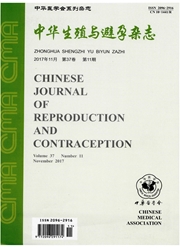

 中文摘要:
中文摘要:
母-胎界面免疫耐受状态的形成是胚胎植入和妊娠维持过程中的一个关键环节,唯其机制尚不十分清楚。单克隆非特异性抑制因子-β(MNSFβ)(Fau)是一种在体内广泛分布的非抗原特异性的免疫抑制因子,能抑制激活型T细胞和B细胞的增殖,以及T细胞和巨噬细胞中TNFtx等细胞因子的表达,并在胚胎植入及妊娠维持过程中发挥重要作用。由文献报道推测:MNSFβ蛋白有分泌型和非分泌型2种表达形式,而且前者是以完整的MNSFβ蛋白分子单体或多聚体形式分泌到细胞外,后者以MNSFβ蛋白的Ubi—L肽段分别与Bcl-G或endophilinII形成复合物的形式存在于细胞质中。MNSFβ对蜕膜巨噬细胞(dMac)中Cox-2和p53表达的抑制是不利于胚胎植入和妊娠维持的。
 英文摘要:
英文摘要:
The formation and maintaining of the immune tolerance at the maternal-fetal interface is the pivotal event during the embryo implantation and subsequent pregnancy process, but the mechanisms underlying this phenomenon are still not fully understood. Monoclonal nonspecific supressor factor β (MNSFβ) (Fau) is a ubiqui- tously distributed cytokin that possesses an antigen-nonspecific immune-suppressive function, and plays critical roles in embryo implantation and early pregnancy. The report from the literatures speculated that MNSFβ protein was devided into two forms of expression: secreted and non-secreted protein. The former was secreted into the extracellular in the complete monomer or polymer form of MNSFβ protein molecules and the latter existed in the cytoplasm in the forms of the Ubi-L peptide segments and Bcl-G or endophilin II complex. The inhibition of Cox-2 and p53 expression in the decidual macrophages (dMac) by MNSFβ was not conducive to the maintenance of embryo implantation and pregnancy.
 同期刊论文项目
同期刊论文项目
 同项目期刊论文
同项目期刊论文
 期刊信息
期刊信息
